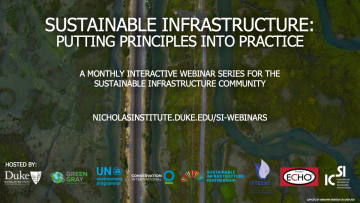
On 14 July 2021, this webinar in the Sustainable Infrastructure: Putting Principles into Practice series will explore Responsive, Resilient, and Flexible Service Provision, Principle #2 from UNEP's International Good Practice Principles for Sustainable Infrastructure.
- Exchange state-of-the-art knowledge on how to plan and build sustainable infrastructure;
- Participate in an interactive forum to learn from other practitioners as they present case studies, including best practices and pitfalls; and
- Connect with a community of individuals and organizations engaged in the sustainable infrastructure sphere.
Technical and case study presentations will focus on one of ten principles from UNEP’s International Good Practice Principles for Sustainable Infrastructure:
- Strategic Planning
- Responsive, Resilient, and Flexible Service Provision
- Comprehensive Lifecycle Assessment of Sustainability
- Avoiding Environmental Impacts and Investing in Nature
- Resource Efficiency and Circularity
- Equity, Inclusiveness, and Empowerment
- Enhancing Economic Benefits
- Fiscal Sustainability and Innovative Financing
- Transparent, Inclusive, and Participatory Decision-Making
- Evidence-Based Decision-Making
This session provides an introduction to Principle #2, followed by a technical presentation on systems-based tools developed by UNOPS that help infrastructure planners prioritize infrastructure projects and systems that are responsible, resilient, and flexible from the outset. The remainder of the session includes the exploration of a relevant case study, including interactive activities that will allow exchange between the presenters and participants regarding sustainability challenges and solutions related to real-world infrastructure projects.
Go to webinar recording
Hosted by: Sustainable Infrastructure Partnership, Duke University Nicholas Institute for Environmental Policy Solutions, the Green Gray Community of Practice, UN Environment Programme, Conservation International, ITTECOP, and Project ECHO
